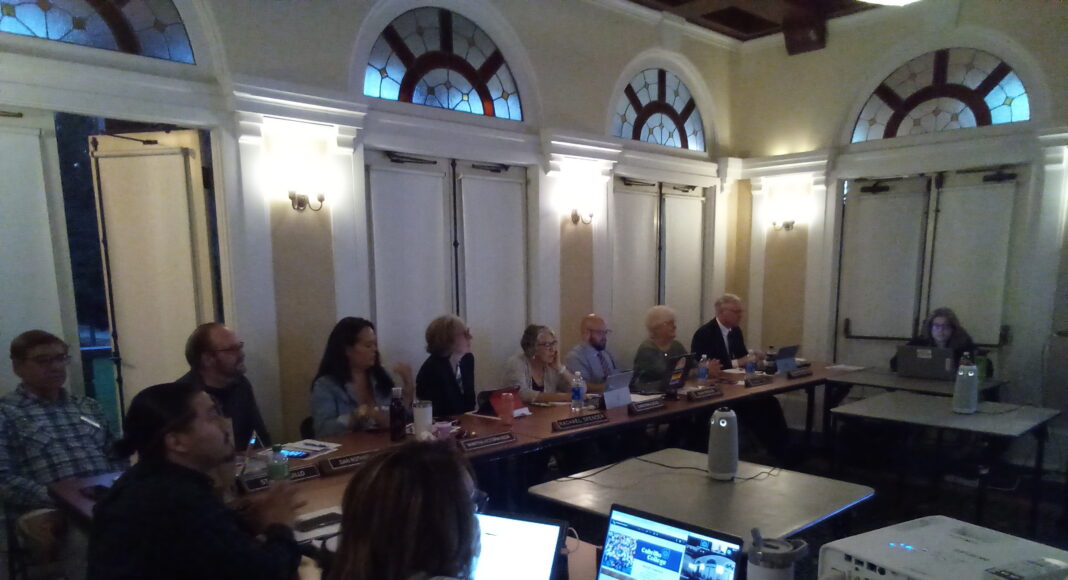On Monday night, the Cabrillo Board of Trustees voted 6 to 1 to approve a resolution that defers renaming the college until 2028.
The decision ends a process that included years of advice, research, consideration, and conflict stemming from a petition to replace the name Cabrillo with one unassociated with conquest, colonization and exploitation.
The Name Exploration Subcommittee that wrote the recommendation and has overseen the process from the outset—whose members included Cabrillo College President Matt Weinstein, trustees Christina Cuevas and Adam Spickler—will be dissolved. It will be replaced in October by a subcommittee tasked with implementing the other recommendations approved by the vote.
Some of the recommendations include: making the college’s disassociation from Juan Rodriguez Cabrillo more explicit, developing an annual Native American Studies lecture series, creating a faculty position in Indigenous and Native American Studies, establishing scholarships for students majoring in Indigenous and Native American Studies, to name a few.
Prior to the deciding vote, two trustees offered competing recommendations.
Trustee Steve Trujillo, representing his Watsonville constituency, wanted to delay the name change by only eleven months, a time he believed as sufficient for garnering the necessary funding.
Trustee Rachel Spencer, a name-change supporter but an outspoken critic of the process, wanted to amend the recommendation to rescind the original vote to replace the college name, thereby starting with a blank slate.
Neither suggestion was met with any approval from the other trustees.
Held in Cabrillo’s historic Sesnon House, the meeting attracted more than a dozen members of the public.
Most who came to share their opinion of the resolution were against delaying the change, with some accusing the trustees of caving to moneyed interests. Some, like faculty member John Govsky, conceded that the community could benefit from a delay, though he called five years “excessive.”
“There’s fear here, I recognize that,” Govsky said. “Maybe it makes sense to take a pause.”.
Fewer of the anti-name change community showed up. Their statements were greeted with smatterings of polite applause, while the advocates of the name change were cheered on loudly.
In conversation with members of the press following the meeting, Trustees Adam Spickler and Christina Cuevas stressed that their decision to delay renaming the college is based on legitimate concerns over the need to fully involve and inform the community. They explained that the length of time chosen for the deferred name choice is somewhat arbitrary and could be changed at a future time.
Cuevas explained that the message the Committee wants to convey is that they listen to the concerns of those who felt excluded from the discussion.
“We need to rethink how this works, and what the timing should be and what the approach would be,” she said. “So let’s go back to the drawing board and figure out an approach that’s more engaging.”
“What we didn’t want to convey is that we caved in,” said Cuevas.
Spickler specifically said he refuses to back down from his belief that a name change is inevitable.
Both are insistent the decision to rename Cabrillo remains, as was shown in the night’s voting.
Trustee Dan Rothwell stated he remained firmly in favor of the change, though he voted for the five-year postponement mainly because the funds needed to implement the change were not yet in-hand.
Cuevas was forthright that money did play some part in the decision to delay, explaining the trustees financial responsibility to acknowledge that the loss of funding is harmful to the students.
By devoting attention to goals like hiring Indigenous faculty and building greater cross-cultural interaction, the trustees expect a growing understanding of what is termed “colonial naming.”
They point to the change in opinions that they witnessed in attendees of the various forums and lectures as proof that views toward the name-change can evolve over time with enough dialog and education.
Spickler looks forward to the coming months and years as time for learning and growing and engaging.
“Invite people in to talk about it, have a dialogue about it, not get entrenched in a yes-no over a college name, where you dig in your heels and that’s the only thing you see,” he said. “That was never our intent. We’re a community that cares about people. Let’s get back to that.”















good, just leave it and establish other spheres within the JC to distance itself from the “ignominy” of having named a learning institution after this guy…honestly, it seems likethe tail of a few wagging the dog of the many…besides, it would cost millions of $$$